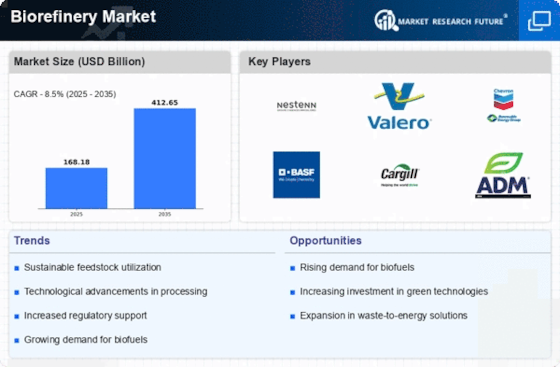Top Industry Leaders in the Biorefinery Market
*Disclaimer: List of key companies in no particular order
Top listed global companies in the Biorefinery industry are:
Honeywell International Inc.
Chempolis
Sekab
Ørsted A/S
IES BIOGAS srl
AB HOLDING SPA
Zea2 Bioworks
UPM Global
Neste
BTS Biogas Srl/GmbH
Bridging the Gap by Exploring the Competitive Landscape of the Biorefinery Top Players
The biorefinery market, poised for significant growth in the coming years, is brimming with intense competition as established players jockey for position and new entrants vie for a slice of the pie. Understanding the key strategies, trends, and factors influencing market share is crucial for anyone navigating this dynamic landscape.
Established Players: Consolidation and Diversification
Leading players like Neste Oil, Poet, Abengoa Bioenergy, and Valero Energy Corp. are adopting a two-pronged approach: consolidation and diversification. Mergers and acquisitions are seen as a way to expand existing capacity, secure feedstock supplies, and access new markets. Neste Oil's recent acquisition of Verbio reinforces its leadership in renewable diesel production, while Poet's purchase of Green Plains Renewable Energy expands its ethanol footprint.
Diversification is another key strategy. Players are moving beyond traditional biofuels and chemicals, venturing into bio-based materials, pharmaceuticals, and other high-value products. Neste Oil's focus on sustainable aviation fuel exemplifies this trend, while Valero Energy's investments in renewable natural gas production demonstrate a shift towards cleaner energy solutions.
Factors Shaping Market Share: Innovation and Sustainability
Technology leadership and a commitment to sustainability are becoming key differentiators in the market. Companies like LanzaTech are pioneering innovative technologies like gas fermentation, while Novozymes is spearheading enzyme development for efficient biomass conversion. These advancements unlock new feedstock options and improve process yields, giving these companies a competitive edge.
Environmental responsibility is also a major factor. Companies are demonstrating their commitment to reducing carbon footprint and minimizing waste generation. Neste Oil's focus on circular economy principles and Poet's use of low-carbon ethanol production methods are examples of how sustainability is becoming a competitive advantage.
New Entrants: Disruption and Niche Focus
New players are also making their mark, often specializing in niche markets or disruptive technologies. Companies like Virent are developing cellulosic ethanol from non-food crops, while Amyris leverages synthetic biology to produce renewable chemicals. These players bring fresh perspectives and innovative solutions, challenging the established order and creating new market segments.
Emerging Trends: Digitalization and Integration
Digitalization is rapidly transforming the biorefinery landscape. Companies are adopting smart sensors, data analytics, and machine learning to optimize operations, improve efficiency, and predict maintenance needs. This data-driven approach allows for real-time process control and faster decision-making, leading to significant cost savings and increased profitability.
Integration across the value chain is another emerging trend. Companies are moving beyond stand-alone biorefineries, forging partnerships with feedstock suppliers, distributors, and end-users. This creates a more resilient and efficient ecosystem, fostering collaboration and knowledge sharing.
Overall Competitive Scenario: Collaboration and Adaptation
The biorefinery market is characterized by intense competition, with established players leveraging their experience and resources while new entrants bring innovation and agility. Collaboration across the value chain and a focus on innovation and sustainability are essential for success. Companies that can adapt quickly to changing market dynamics and embrace new technologies will be well-positioned to thrive in this rapidly evolving landscape.
Latest Company Updates:
Honeywell International Inc.
- Date: December 15, 2023
- Source: Honeywell press release
- Development: Announced a collaboration with LanzaTech to develop a sustainable jet fuel production process using waste biomass.
Chempolis
- Date: January 10, 2024
- Source: Chempolis website
- Development: Published a report on the growing market for bioplastics, highlighting the potential for biorefineries to play a key role in supplying feedstock.
Sekab
- Date: November 29, 2023
- Source: Sekab press release
- Development: Inaugurated a new biorefinery in Sweden that will produce bioethanol and lignin from wood chips.
Ørsted A/S
- Date: December 7, 2023
- Source: Ørsted website
- Development: Announced plans to invest €1 billion in a new biorefinery in Denmark that will produce renewable chemicals from straw and wood residues.










